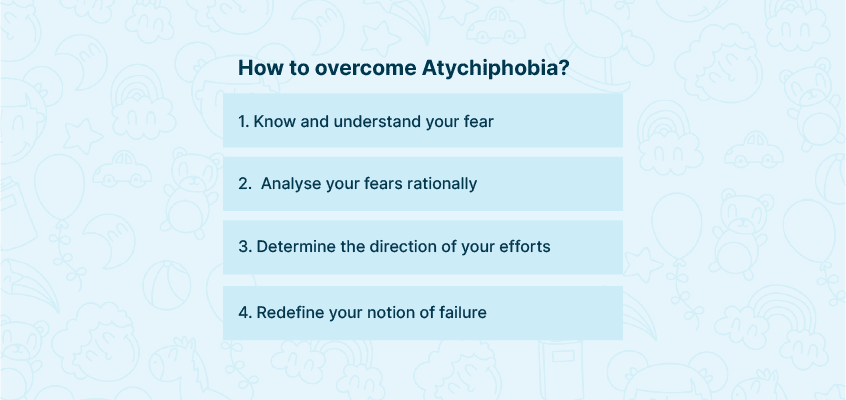Introduction
We have all experienced trepidation at the prospect of dissatisfying results, and it is natural. Fear is a necessary human emotion that helps us be cautious. It increases focus and can help some people perform better. However, some individuals experience extreme fear of failure, which is a real problem.
Our Wellness Programs
What is Atychiphobia?
Atychiphobia is an overwhelming fear of failure. Characterized by irrational and extreme distress resulting from one’s flaws, it is associated with anxiety and mood disorders, depression, and low self-esteem. It makes people think that any mistake they make will have disastrous consequences. It might be caused by the person’s experiences of failure that had devastating repercussions or because of a connection between their self-worth and other people’s perceptions. Atychiphobia causes self-doubt that restrains people and keeps them from advancing in life.

Looking for services related to this subject? Get in touch with these experts today!!
Experts

Kirti Bajpai

India
Psychologist
Experience: 5 years

Neelam Parwani

India
Life Coach
Experience: 5 years

Mansi Chawla

India
Psychologist
Experience: 12 years

Sapna Zarwal

India
Psychologist
Experience: 19 years

Deepti Gandhi

India
Life Coach
Experience: 6 years

Zabby Sharma

India
Life Coach
Experience: 11 years
What are the symptoms of Atychiphobia?
Everyone experiences Atychiphobia differently. Symptoms can manifest physically or emotionally, likely triggered when you think about specific situations involving failure. The severity of the symptoms can range from mild to extreme. It can completely paralyze you, make it difficult to work, and may cause you to miss out on significant opportunities. Here are some signs and symptoms of Atychiphobia:
What are the Physical Symptoms of Atychiphobia?
- Rapid heart rate
- Difficulty in breathing
- Stress, causing pain or tightness in the chest
- Digestive distress
- Joint and muscle pain
- Splitting headaches
- Profuse sweating
- Fatigue
- Dizziness
- Trembling sensations
- Hot or cold flashes
- Insomnia due to overthinking
What are the Emotional Symptoms of Atychiphobia?
- Excessive anxiety and worry about situations going wrong.
- An overwhelming need to escape the condition that causes fear
- Thinking and believing that you will die or pass out
- One may feel detached from themselves and surroundings.
- Procrastination and avoidance of triggering situations
- Unnecessary rationalization of how something will go wrong
- Obsessive and disruptive thoughts
- Feeling immensely powerless
What is the test of Atychiphobia?
If your fear of failure is constant and severe enough to affect your daily functioning, then it may be Atychiphobia. A doctor or therapist can help you diagnose your symptoms and suggest suitable treatment options. If you seek help, you’ll answer questions about the symptoms you’re experiencing, your personal, social, and psychiatric history, and any prescription medications you’re taking. Criteria for a formal diagnosis of Atychiphobia is:
- Patients have fear or anxiety of failure.
- Atychiphobic situations almost always provoke immediate fear/anxiety.
- One avoids Atychiphobic scenarios or endures with intense fear.
- The fear, anxiety, or avoidance is persistent, typically lasting for six months or more.
- Fear and anxiety may result in release. It causes distress that has clinical significance. It may lead to pain in social, occupational, or other areas of functioning.
- Exhibiting a different mental disorder does not better explain symptoms.
How to overcome Atychiphobia?
Here are some guidelines on overcoming Atychiphobia:
- Know and understand your fear
Try to assess the cause of your fear and how it has developed. Reflect on what will happen if you fail and why you feel it is imminent. It can help you have crucial realizations. For example, if your fear stems out of a desire for perfection, then shift your focus towards progression. Appreciate the joy of improvement and be kind to yourself.
- Analyze your fears rationally.
Try to rationally think about your fear and attempt to understand the actual extent of the danger you’re facing. Question if your situation is severe enough to worry about in the first place. Writing down your fears can help you simplify them without emotions.
- Determine the direction of your efforts
Experiencing debilitating fear and anxiety frequently requires a lot of energy. You might be subconsciously doing things that exacerbate the situation. Try to identify any self-sabotaging or destructive behavior like procrastination. It can help you change your mindset and learn how to respond to stress.
4 . Redefine your notion of failure
Try to find silver linings in any of your past failures and learn from them. Realizing that failures are great opportunities to improve and life challenges are rarely of the ‘succeed or die’ nature can help you overcome your fear.
- Embrace the inevitability of failure
Understand that you cannot always be successful, no matter how hard you try. Every great person has faced failures, some repeatedly, and the key to their success was perseverance. Facing temporary setbacks is a part of life. Anticipating and accepting some of them beforehand can help reduce your anxiety.
- Face your fears
Continual exposure to fears is known to subside anxiety. Allow yourself to attempt and fail at things. Assess your feelings about failure, expect the worst-case scenario, and believe that you will overcome it.
- Take control
Own your thoughts and your reality. If a task seems overwhelming, try to divide it into approachable parts. Be more solution-oriented in your approach to a problem. Think of a practical plan and take action. A step-by-step plan will help reduce your fear and increase your chances of success.
- Consider some lifestyle changes.
Specific lifestyle changes, like relaxation techniques, exercising regularly, and yoga might help you destress. These changes might help you clear your mind and avoid distracting thoughts.
- Seek professional help.
If your Atychiphobia is too severe for you to deal with by yourself, then absolutely do not hesitate to seek help from a mental health professional. Treatment plans for phobias, in general, are built around improving quality of life. Although medication is available, treatment tends to be most effective when coupled with therapy. Your therapist might use techniques like exposure therapy or cognitive behavioural therapy. Beta-blockers and SSRIs are a few suggested medications that act as an initial short-term solution for anxiety. UnitedWeCare specializes in dealing with situations like these, among others, which you can find here.
Conclusion
Overcoming Atychiphobia is by no means an easy task. But it is essential if you want to fulfil your dreams and reach your maximum potential. You are not alone, and there are scores of people dealing with the same problem. You should not refrain from seeking medical help if you feel like it. Consider these UnitedWeCare resources if you need professional help:

















